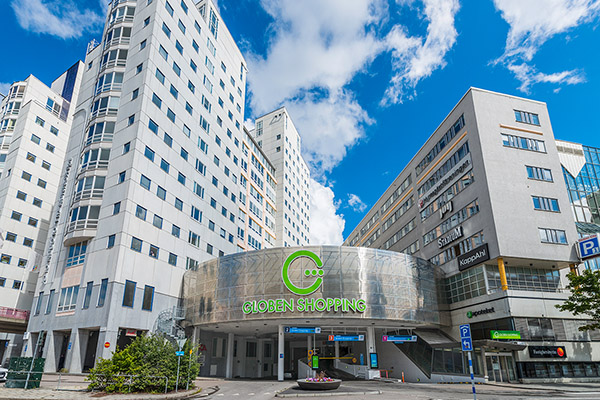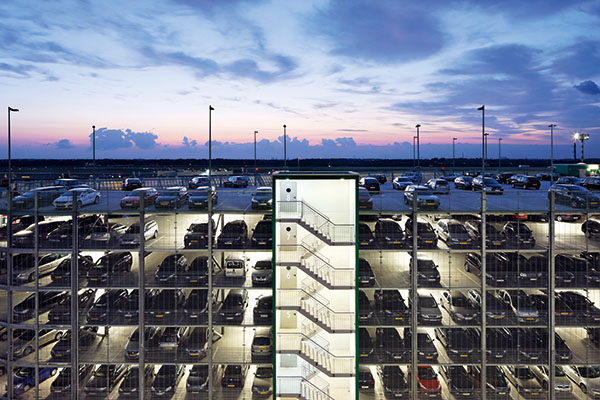Editorial

Dear Readers,
As car park operators, we consider ourselves to be an essential element of the mobility sector. After all, a car driver – and who doesn’t know this – only feels truly mobile when he finds a convenient parking space at his destination. At the same time, APCOA is also at home in the real estate sector. A car park is, after all, a piece of property. In fact, it is an important interface between the company, that runs its business on the property, and the people, who it is looking to attract.
This is especially true for retail. For many customers, the way to the supermarket, shopping centre or retail park goes through the parking garage. Being able to park comfortably plays a considerable role in the entire shopping experience. Particularly in many retail parks, as well as food retailing, the ease of transporting goods is essential when deciding where to buy. Moreover, the service in the car park contributes to the image of the shops.
In the era of digitalisation, these factors will only become more marked in future. The demands of consumers, particularly regarding convenience, will only increase with the opportunities that digital transformation offers. The car park now assumes the functions of a digital interface to the customer – for example, by offering contactless payment methods or online reservations for attractive parking spaces. Customers are more willing to register for these kinds of services than for services offered within the shops themselves.
There are many more exciting topics in store for the parking industry. With this newsletter, we would like to give you an insight into the opportunities within our industry and hope that you enjoy reading it.
Your Philippe Op de Beeck
CEO APCOA PARKING Group
Parking management in the retail sector
Enhancing customer loyalty with e-parking

Car parks are going digital. This will make it easier than ever for drivers to find a convenient parking space when they are out shopping. And for retailers, these innovative technologies are creating totally new marketing opportunities.
The car park’s barrier rises automatically as the car approaches. After all, the driver has already booked their parking space via their smartphone app. Payment is contactless and parking fees are billed monthly, for example to the driver’s credit card. This is all made possible by the networked technologies within the state-of-the-art car park. Cars are recognised thanks to RFID chips or automatic number plate recognition. In order to take advantage of these services, drivers just need to complete a short, one-off registration procedure. Once they have done so, they can use the services again and again, and not just in their regular car park, but in other APCOA car parks, too. Such innovations don’t just inspire car park operators, they are also firing the imaginations of the retail sector as a whole.
Islands of relaxation, not just parking bays
Digital services mean that parking is a welcome opportunity to get to know customers even better. After all, car parks are going to become a major issue in many cities in the near future. In many cases, politicians and citizen’s groups would like to ban cars entirely from the most central zones of their cities. As a result, on-street parking bays are being turned into islands of relaxation, complete with flower arrangements – constantly reducing the number of parking spaces on offer. And then drivers are asked to pay more and more to use the parking spaces that do survive. At the same time, retailers know that they need to provide convenient parking facilities if their shops and shopping centres are to retain car-driving customers.
When they go shopping, Germans love to have their cars close by. Their latest purchases are, after all, often heavy and bulky – whether it’s a new TV from a home electronics store or the big, weekly shop from the supermarket. And customer expectations are only going to increase. Let’s not forget, brick-and-mortar retailers face stiff competition from online retailers, who can deliver their goods to their customers’ front doors in ever-shorter periods of time.
New car park services
Car parks offer retailers an attractive alternative to on-street parking provided by municipal authorities. Constant technological advances also mean that retailers can offer their customers an ever-expanding range of value-add services. As a result, they can easily differentiate themselves from their competitors. Parking spaces in multi-storey car parks are not all equal – some spaces are more desirable than others. Drivers who are lucky enough to find a parking space on the first floor, close to the elevators, certainly feel like winners in the competition for the best spaces.
But wouldn’t they also be willing to pay more for these prime spaces? Or wouldn’t they feel rewarded for their loyalty if their regular shopping centre gave them first option to reserve and use such spaces?
In return, digitalised car parks provide car park operators and retailers with more detailed information about their customers. In compliance with data protection legislation, the information can include details of which regions their customers come from and how long they stay – all of which helps retailers and operators to tailor their services more effectively.
Asset class: Car park investment funds
Car parks are becoming ever more attractive

Car park investment funds are still a niche product, according to Ruud Roosen, investment fund director for Bouwfonds European Real Estate Parking Fund II. But with increasing rates of car park utilisation, the investment products are becoming ever more attractive. Roosen sees a lot potential, particularly in Germany.
How are your car park investment funds selling?
Very well. In recent years, interest has noticeably grown, both among private and also institutional investors. It was a much different situation in 2005 when we issued our first pure car park investment fund. The investors were rather sceptical. But today, investors see how much they pay for parking and want to profit from it themselves. To meet this demand, we have successfully issued two funds for private investors and three funds for institutional investors.
The current low interest rate environment surely plays a role.
Of course. When you have a current internal rate of return of 6 to 7 percent and a return on investment of between 4.5 and 5.5 percent, our car park investment funds look very attractive. Most investors do not just look at the return, they also want security. And this is where our investment funds perform better when compared to real estate funds that invest in office buildings.
Because a constant capacity is assumed?
Exactly. If a principal tenant leaves the office building, no income can be generated because of the vacancy. But the costs remain. However, if the car park operator has to file bankruptcy, revenues continue to be generated – because car drivers will continue to park in the building. As well, the parking sector has weathered previous crises well.
How important is the operator in all of this?
It is vitally important for us to establish a long-term business relationship with a reliable and professional car park operator. Because it is only when the operator really understands his business and runs a professional operation that he can increase turnover in the long run and add value to the car park. This is why we appreciate working with APCOA so much.
Is there still room at the top for increased sales?
In Germany for sure. On the one hand, fees in German car parks are still quite inexpensive. On the other hand, parking spaces continue to vanish – also because cities are forcing cars from the streets. This is why car parks are becoming ever more attractive.
But isn’t it a problem for inner-city car parks when the city centre strives to be car-free?
That depends on the location and future traffic planning. For example, a car park on the outskirts of a traffic-calmed inner city will have plenty of business. We pay very close attention to this when we invest.
Urban development and parking
Parking is more relaxed in Braunschweig

What is the relationship between the objective parking situation in different cities and their citizens’ subjective perceptions? This question has been investigated by the Allensbach Institute for Public Opinion Research, which analysed the situation in Braunschweig and Halle an der Saale. The results are surprising: Drivers are more relaxed and content where parking is most difficult.
On-street parking spaces are in short supply in Germany’s inner cities. This is a fact of life that Brauschweig’s drivers are used to. Anyone who takes their car into this city in Lower Saxony already knows: Trying to find a convenient, on-street parking space is an almost hopeless task, there aren’t many spaces and they are nearly always occupied. It makes more sense to head straight to one of the off-street, multi-storey car parks instead.
This pattern of behaviour is one of the discoveries made by researchers from the Allensbach Institute for Public Opinion Research. Commissioned by APCOA, they interviewed 101 citizens in Braunschweig and the same number in Halle an der Saale. The aim of the study was to compare the objective parking situations in each city with drivers’ subjective perceptions. The criteria used in the analysis included the volumes of traffic heading into central areas, the number of cars per 1,000 residents and the number of parking spaces available in the city centre. According to the APCOA Parking Space Index, the situation in Braunschweig is extremely relaxed.
Straight to the multi-storey car park
Drivers in Braunschweig describe the parking situation in their city as unproblematic – largely because they are already fully aware of the limited number of on-street parking spaces, which means they tend to head directly to an off-street, multi-storey car park. As a result, 50 per cent of Braunschweigers said that it is normally “easy” or “very easy” to find a parking space. 61 per cent find a space “quickly” or “immediately”. Only 26 per cent even bother trying to find an on-street space; 66 per cent head straight to a multi-storey car park. This makes Braunschweig’s drivers among the most relaxed: 39 per cent of drivers claimed that a drive into the city centre is “fun”, and only 27 per cent said that it is “stressful”.
Searching in narrow streets
The situation is very different in Halle an der Saale. Although the supply of parking spaces is relatively generous in the city, drivers perceive the situation as “difficult”. The reason: 57 per cent of drivers try to find an on-street space in one of the city centre’s many narrow and twisting side streets – partly because they think that the fees in off-street car parks are too high. Only 34 per cent of drivers in Halle make a beeline for a multi-storey car park. Those searching the streets in vain pay a high cost in terms of time and nerves. As a result, 79 per cent of Halle’s population are of the opinion that it is difficult to find a parking space in the city. 49 per cent said that it takes a “long time” to find a space. The drive into the city is a source of stress for 48 per cent; only 16 per cent said that they enjoy their journey into the city centre.
Conclusion: “A co-ordinated approach to city centre parking management reduces both stress and the volume of cars circling around the city looking for a parking space,” said the Allensbach Institute’s experts in summarising their study’s conclusions.
Content
- Editorial
- Parking management in the retail sector:
Enhancing customer loyalty with e-parking - Asset class: Car park investment funds:
Car parks are becoming ever more attractive - Urban development and parking:
Parking is more relaxed in Braunschweig



